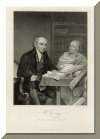
CENTER FOR STUDY OF THE LIFE AND WORK OF
WILLIAM CAREY, D. D. (1761-1834)
William Carey University
Hattiesburg, Mississippi
http://www.wmcarey.edu/carey/
Bennie R. Crockett, Jr., and Myron C. Noonkester, Co-Directors
The life and work of William Carey, D. D. (1761-1834) define the mission of William Carey College. A self-educated cobbler and pastor from the English midlands, Carey heralded the formation of the Baptist Missionary Society in 1792 with his watchword "Expect great things; attempt great things" and his missions pamphlet An Enquiry into the Obligations of Christians to Use Means for the Conversion of the Heathens (1792). The following year, in 1793, he and his family journeyed to India to undertake Christian mission work. Over the next 41 years spent primarily in Serampore, Bengal, Carey labored to show himself approved as an evangelist, Bible translator, social reformer, educator, linguist, and botanist. "Serampore" became synonymous with earnest spirituality, intellectual renaissance, and social improvement. Directed by Carey and colleagues William Ward and Joshua and Hannah Marshman, the Serampore mission printed the Bible in numerous Indian dialects, pioneered the education of Indian women, campaigned against caste and widow-burning, and brought numerous converts to a saving knowledge of Christ.
Carey’s understanding of mission prompted him to publish grammars and dictionaries of several Indian languages. He also edited two important botanical works, Hortus Bengalensis (1814) and Flora Indica (2 vols., 1820, 1824). Putting to practice his scholarly work, Carey and his colleagues founded Serampore College (1818) and the Agricultural and Horticultural Society of India (1820). Carey also helped to start Savings Banks in India, brought one of the first steam engines to India, and published India’s first periodical, The Friend of India. In recognition of Carey’s accomplishments, Brown University awarded him the Doctor of Divinity degree (1806) and the Linnaean Society of London registered him as a fellow. Carey’s comprehensive vision of Christian faith and practice forms a model that faculty and students at William Carey College strive to attain.
Initiated in the summer of 2000, the purpose of the Center for Study of the Life and Work of William Carey is to promote an understanding of the accomplishments of William Carey (1761-1834) and to enhance appreciation of the religious, cultural, scientific, and historical contexts in which Carey worked in Britain and India. Carey, a figure of international significance, and his work as a Christian missionary, social reformer, linguist, botanist, and educator in India, 1793-1834, are the interests of the Center.
Specific objectives of the Center include the following:
to map and inventory sources of knowledge regarding Carey’s mission in repositories such as the Carey Library at Serampore College, the Angus Library at Regent’s Park College, Oxford and the Northamptonshire Record Office, United Kingdom;
to present knowledge regarding Carey’s mission, primarily through a web site, which includes (a) photographic images of Carey, Carey biographies, Serampore memorabilia, and letters and journals relevant to Carey; (b) an annotated bibliography of works regarding Carey’s mission featuring reviews and, if available under copyright law, the works themselves; (c) a devotional section; (d) up-to-date scholarship regarding Carey’s mission; and (e) a remarks page;
to preserve in appropriate form as many texts and artifacts related to Carey’s mission as feasible;
to seek external funding support from foundations, denominational agencies and philanthropists, particularly in order to facilitate the travel necessary to reconnoiter and acquire in appropriate form the diverse sources relative to Carey’s mission that are scattered from Serampore to Denmark, from Rhode Island to the United Kingdom;
to sponsor research related to the mission of William Carey.
Related to William Carey College’s identity, the Center’s activities are designed to:
identify the Christian, scholarly, and mission aims of William Carey College;
involve numerous disciplines taught by the College;
promote collegiality by offering faculty and students an opportunity to interact in a common inter-disciplinary purpose; and
offer the College a visible and distinguished stake in realms of scholarship and mission activity.
The Center for Study of the Life and Work of William Carey, D.D. (1761-1834) has received local, national, and international acclaim. Soon after the public release of the Center’s web site in March, 2001, the Australian-based Asian Studies Monitor, a clearinghouse for academic study of Asian-related materials, awarded the Center a "five-star, essential rating."
The Center has had the opportunity of providing primary and secondary source materials for local churches, Christian mission enthusiasts, students of all ages, scholars, and international researchers as they have sought information about William Carey and the Serampore mission. In addition since 2001, the Carey Center's website has received millions of visits from people throughout the world. Such significant and widespread interest in the Center underscores the international importance that William Carey (1761-1834) continues to hold.
On May 3, 2006, the Center opened and dedicated its permanent home in Donnell Hall. The initial exhibit in the museum, "Beyond Expectation, William Carey Revealed . . . ," contains 116 items (i.e., artifacts, historic Bibles, books, manuscripts, portraits, and prints) in five categories: Bible Translator, Missionary, Linguist, Social Reformer, and Scientist.
Created: August 10, 2000 Updated: March 8, 2012